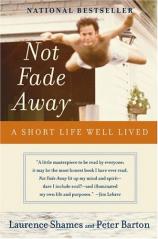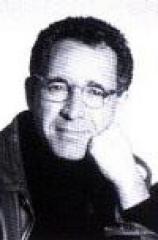Interview: October 3, 2003
October 3, 2003
Carol Fitzgerald, co-Founder of Bookreporter.com spoke with Laurence Shames, author of NOT FADE AWAY about how he came to write Peter Barton's story (a well-known thriller author introduced them), what he learned from Peter's life and death, and what readers are sharing with him after they read the book.
BRC: Can you tell us about Peter Barton and how you came to write his story?
LS: Peter's resume describes him as a co-founder and CEO of Liberty Media --- a big company that helped launch cable TV channels such as MTV, QVC, The Discovery Channel, The Learning Channel, and many others. But I prefer to think of him, first and foremost, as a person who participated fully in his times. He had amazing energy, unlimited chutzpah and a tremendous instinct for where the action was. He was at Columbia in the '60s, a ski-bum in Aspen in the '70s; he worked in NY State government during the NYC financial bailout, and helped implement the "I Love NY" ad campaign. He was a devoted husband and a father who was profoundly involved in the raising of his three kids. He packed an extraordinary amount of living into his 51 years, and considered himself a very lucky man.
As to how we met, let's say it was improbable but inevitable. A mutual friend, the novelist Stephen White, called to say there was this remarkable guy in Denver, who was dying, and whose last wish was to leave a sort of testament for his children. Was I interested in working with him? It so happened that my wife and I were on vacation in Hawaii at the time. We'd just woken up from a nap. Marilyn was peeling a mango. It was one of those moments when life seems almost unbearably sweet and precious. And I was supposed to think about death? I said no way. But I agreed to speak with Peter --- and he won me over with his smarts, humor, determination, and courage.
BRC: So when you met Peter you knew that he was dying. It's as if you started out on borrowed time. How did that impact your relationship?
LS: Probably most of us have lost friends --- to cancer, to AIDS, to accidents. But this was a really unique situation: The first premise of our friendship was that Peter was surely dying, and my role was to witness the process, to share in it to as great a degree as possible. This was extremely difficult, but I also came to see it as an amazing privilege. As Peter grew sicker, he withdrew from most of his old friends; they'd known him when was a real world-beater, and he was embarrassed by their pity now that he was weak. With Peter and me, there was no past, no shame, no embarrassment. I came to think of myself as a friend for his dying.
BRC: In the course of writing the book, was there any moment when the reality of Peter's looming death became too much for you? If so, what happened?
LS: Peter tried his best to downplay the merely physical side of his illness. He felt that there was nothing redemptive or even very interesting about bodily complaints. Still, for all his stoicism, there were moments when the horrors he was going through became terribly immediate, when his fragility became too obvious not to be rattled by. Once there was a mix-up with some IV tubes --- something as mundane as an air bubble could have ended Peter's life in that moment. But the moments of panic were very much the exception; the lesson --- and even the beauty, I think --- of Peter's passing is that it was an exercise in growing calm and unafraid.
BRC: What did you personally learn from Peter and how did writing this book change your life?
LS: I've always felt that one doesn't write a book to tell what one knows, but rather to discover what one knows. So, in writing Peter's story, I've revisited some of my own most basic beliefs: That a person shows reverence to life by making the most of his potential and his time. That friends and loved ones are to be honored and never taken for granted. That one should never stop changing or embracing risk. Finally, that even death can be regarded as an adventure --- as Peter called it, a last great road trip. Peter did something for me that I regard as an astonishing kindness: he made me at least a little less afraid of my own mortality.
BRC: Peter was a quintessential Baby Boomer. Do you think this generation will approach mortality in a different way from their parents?
LS: Peter was too modest to say this in as many words, but I have no doubt that he wanted his death to serve as a good example for others of his generation. He wanted to die with dignity and grace, and he wanted to actively participate in his dying. He didn't passively follow doctors' orders. He didn't want to die in a hospital, hooked up to a lot of gizmos. Baby boomers have always lived by their own rules; Peter makes the case that that determination can and should be maintained all the way to the end of life.
BRC: NOT FADE AWAY is a book that readers have to talk about when they finish it. What are you hearing from readers?
LS: I have been incredibly moved by the intimacy and intensity of people's reactions to this book. People don't say, nice piece of writing; they say, Peter's story touched my life. And then they proceed to share amazing stories from their own experience. Cancer survivors have told me how much solidarity they felt with Peter's struggle. People who've lost spouses have told me that Peter talks about all the things they wish their own partners had had the time or the will to discuss. People have said that the book became part of their healing. I'm humbled by reactions like that; they remind me what a privilege it is to be a writer.
BRC: Who do you think is the audience for this book?
LS: Peter's story is about two things: Making the most of one's life, and dealing honestly with the inevitability of one's death. If there's anybody out there who either hasn't been born or will not die someday, then this book is not for them.
BRC: Many of your readers know you as a comic thriller author. Will they be surprised you have written a book like this? Do you think that your sense of humor, coupled with Peter's, helped you in writing this book?
LS: A sense of humor always helps, and, thank God, Peter and I were still swapping jokes until just days before his death. We tried our best to be serious without ever getting solemn, still less mawkish ---- and that definitely helped in the writing of the book. As for the five or six people who might remember my Key West novels, I hope they won't be too surprised. My subject matter, after all, has always been human nature, and people's amazingly varied struggles to find dignity and self-worth. I also feel that, in any sort of writing, the first imperative is to make the reader care. With NOT FADE AWAY I have a flesh-and-blood protagonist who is very much worth caring about.
BRC: Are you still speaking with Peter's family? What was their reaction to the book? At what stage did they see it?
LS: I'm happy to say that I've become very close with Peter's widow, Laura, and their three amazing children, Kate, Jeff, and Chris. During the writing of the book, the whole family was extraordinarily gracious and welcoming to me --- even when I worried that I was claiming too much of Peter's radically limited time and energy. I know that Laura and the kids understood how important this mission was to Peter, and they have supported it at every step. Laura actually read a nearly-complete first-draft aloud to Peter as he was dying.
BRC: What do you think Peter would say to you if he saw the book on the shelf in a store?
LS: As a matter of fact, I know exactly what Peter would say: WOW! IT'S A BOOK! WE DID IT! HOW COOL IS THAT?
BRC: What is your next project?
LS: I'm delighted to tell you I have no idea. When I was younger and more ambitious, I used to start a next book practically as soon as I'd finished the last. No more. And maybe this is partly Peter's influence --- I want to spend lots of time with my wife, and traveling, and playing tennis, and tasting wine and cooking. When a story grabs me and won't let go, maybe then I'll do another book.




